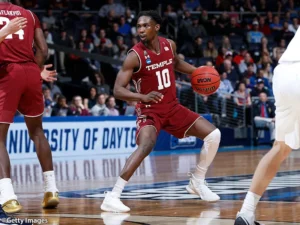Performance anxiety is a common challenge that many athletes face. Whether it’s the pressure of competition, the fear of making mistakes, or the worry of letting down teammates or coaches, anxiety can strike at any moment, hindering performance when it’s needed the most. At Athletes Untapped, we understand how debilitating performance anxiety can be, which is why we incorporate strategies to help athletes manage stress, stay focused, and perform at their highest level, even under pressure.
What is Performance Anxiety?
Performance anxiety, often referred to as “choking,” occurs when an athlete feels an overwhelming sense of nervousness or fear before or during a competition. This anxiety can manifest in different ways, including:
Physical Symptoms: Racing heart, sweating, shallow breathing, muscle tension, or dizziness.
Mental Symptoms: Fear of failure, negative thoughts, self-doubt, or a constant worry about the outcome of a game.
Behavioral Symptoms: Avoidance of competition, a sudden drop in performance, or hesitation to take risks.
While a certain amount of nervous energy is normal before a big game or event, performance anxiety takes things to the next level, often leading to a decrease in performance, mental blocks, or a complete breakdown of focus. The good news is that performance anxiety is something that can be managed and overcome with the right tools and mindset.
The Impact of Performance Anxiety on Athletes
The effects of performance anxiety can vary from athlete to athlete, but here are some of the most common impacts:
- Decreased Performance: Anxiety can interfere with focus, coordination, and reaction time, leading to mistakes and missed opportunities. In high-stakes situations, the pressure can cause athletes to “freeze” and underperform.
- Loss of Confidence: When athletes experience anxiety, they may start doubting their abilities, which can erode self-confidence. A lack of confidence makes it harder to take risks or play with the same level of freedom and creativity they might normally show.
- Mental Fatigue: Constantly battling with anxiety takes a toll on an athlete’s mental energy. The need to manage racing thoughts and physical tension can drain focus and leave athletes feeling mentally exhausted after competition.
- Avoidance of Competition: Some athletes may begin to avoid competitive situations altogether, fearing the anxiety will overwhelm them. This can be detrimental to their development, as they miss out on valuable practice and game-time experience.
- Increased Stress and Burnout: Ongoing performance anxiety can lead to chronic stress, which can result in burnout, physical injury, or even a loss of passion for the sport.
How Athletes Untapped Helps Athletes Manage Performance Anxiety
At Athletes Untapped, we believe that mental strength is just as important as physical ability in the world of sports. Managing performance anxiety is a key aspect of developing a resilient and confident athlete. Our coaches work with athletes to equip them with the tools they need to navigate anxiety, stay focused, and perform under pressure.
Here are some of the ways we help athletes manage performance anxiety:
1. Mindfulness and Breathing Exercises
One of the most effective ways to reduce anxiety is by learning how to stay present in the moment. Mindfulness practices help athletes tune out distractions and reduce the physical and mental symptoms of anxiety. At Athletes Untapped, we teach athletes various breathing exercises, such as deep diaphragmatic breathing or box breathing, to activate the body’s relaxation response. These exercises help athletes calm their nervous system, reduce muscle tension, and regain focus.
2. Visualization Techniques
Visualization is a powerful tool that allows athletes to mentally rehearse successful performances. By imagining themselves performing at their best in a specific scenario, athletes can boost confidence and reduce the fear of failure. We guide athletes through visualization techniques that focus on positive outcomes, specific skills, and the feeling of performing under pressure. Regular visualization can help athletes mentally prepare for the challenges they may face in competition.
3. Positive Self-Talk
Anxiety often stems from negative self-talk and fear of failure. We work with athletes to help them reframe negative thoughts and replace them with empowering affirmations. By shifting from “I’m going to mess up” to “I’m prepared and capable,” athletes can reduce feelings of self-doubt and build a more positive mindset. Our coaches help athletes develop a toolkit of positive mantras that can be used during high-pressure moments.
4. Goal Setting and Focus Techniques
Setting realistic, process-based goals can provide athletes with a sense of control and purpose. Instead of focusing on the outcome, we encourage athletes to concentrate on specific actions they can take to improve their performance. For example, instead of worrying about winning a game, an athlete might focus on making effective passes, staying disciplined in defense, or maintaining a calm mindset. Focusing on the process rather than the result reduces anxiety and allows athletes to perform at their best.
5. Developing Mental Resilience
Athletes who are mentally resilient are better equipped to handle adversity, setbacks, and the pressure of competition. At Athletes Untapped, we teach athletes to view challenges and mistakes as opportunities for growth, rather than threats to their success. Building mental resilience involves learning to stay focused on the present moment, bouncing back from failure, and cultivating a growth mindset. These mental skills help athletes remain composed, even when the pressure is on.
6. Performance Anxiety Education
Understanding that performance anxiety is a natural and common part of sports can go a long way in reducing its power. At Athletes Untapped, we educate athletes on the causes of anxiety and its effects on the body and mind. When athletes understand that anxiety is something they can control, they are more likely to approach it with a proactive, rather than reactive, mindset.
The Long-Term Benefits of Managing Performance Anxiety
Successfully managing performance anxiety can have lasting positive effects on an athlete’s overall mental and physical health:
- Improved Confidence: As athletes learn to manage anxiety, they also build confidence in their ability to handle pressure. This self-assurance carries over into both training and competition, making athletes more willing to take risks and perform with ease.
- Better Focus: Athletes who are able to manage anxiety are better able to stay focused on the task at hand, instead of becoming distracted by fears or worries. This increased focus leads to better decision-making and more consistent performances.
- Sustained Motivation: By learning how to cope with performance anxiety, athletes can maintain motivation and enthusiasm for their sport, even in challenging moments. This resilience helps athletes persevere through tough times and continue striving for improvement.
- Lower Stress Levels: Managing performance anxiety reduces overall stress, helping athletes maintain their physical and mental health. Lower stress levels mean reduced risk of burnout, injury, and mental fatigue.
- Increased Enjoyment: When athletes are able to manage anxiety and perform at their best, they are more likely to enjoy the process of competition and training. This enjoyment fuels passion, perseverance, and long-term success.
Overcome Performance Anxiety with Athletes Untapped
At Athletes Untapped, we understand that performance anxiety is a hurdle every athlete will face at some point. However, with the right mindset and tools, anxiety doesn’t have to hold you back. Our holistic approach to coaching combines mental performance strategies with physical training to help athletes build the mental strength needed to perform under pressure.




